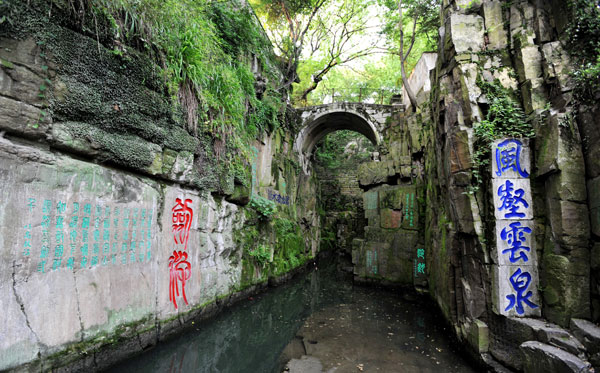Putting war to rest
Updated: 2013-03-28 00:13
By Raymond Zhou (China Daily)
|
||||||||
 |
|
The Sword Pond is a small-scale site awash in mystery. Photo provided to China Daily |
Taoist monks and Buddhist priests arrived to search for immortality, leaving behind a 1,600-year-old monastery (the current architecture is 140 years old), a 1,050-year-old pagoda and numerous artifacts. Literary luminaries used to hang out here as recluses, leaving behind poems, pavilions and meditations on life and nature.
There is a well in memory of Lu Yu (AD 755-804), whose Tea Bible is the epitome of the art of Chinese tea-drinking.
Suzhou produces a fine tea called Biluochun - literally, Green Snail Spring. One sip and you'll understand why this canal-strewn town has given rise to a pervasively mild disposition and why so many of its literary and artistic talents eschew bacchanalian pursuits for subtlety and refinement. You can simply imagine a group of them partaking of tea at one of the hilltop terraces or pavilions, playing chess or singing Kunqu Opera while overlooking waves of curved roof-tiles.
However, long spells of peace and tranquility were punctuated with war and revolution.
Some of the tombs are for those who rebelled against local tyranny or, in one case, one who led an uprising against exorbitant taxation. And around the time of the despotic King He Lu, a native son excelled with his wisdom about military action into The Art of War. His name was Sun Tzu and there is a pavilion in his honor.
How did a Sparta-like culture advance into quiet benevolence and subdued refinement? History books do not tell. Nor do the birds and brooks on Tiger Hill. But one saga may shed some light.
Before King He Lu died, he told his son to avenge him. The young king, Fuchai, invaded the Kingdom of Yue and captured its king and made him a slave. After showing sufficient submission, the Yue King was released. Upon returning home, he sent a femme fatale as a gift to King Fuchai, who promptly fell in love.
It turns out the beauty was a Mata Hari, who used the king's trust to alienate him from his advisers and generals. In the end, the kingdom was conquered by Yue while King Fuchai, who reigned 495-473 BC, was driven to suicide, though not on Tiger Hill.
It should be a cautionary tale for blind love, but it seems local people were set on a path for love, not war, as most of the relics in this small patch of nature show their love for a good and peaceful life.
Contact the writer at raymondzhou@chinadaily.com.cn.

 'Taken 2' grabs movie box office crown
'Taken 2' grabs movie box office crown
 Rihanna's 'Diamonds' tops UK pop chart
Rihanna's 'Diamonds' tops UK pop chart
 Fans get look at vintage Rolling Stones
Fans get look at vintage Rolling Stones
 Celebrities attend Power of Women event
Celebrities attend Power of Women event
 Ang Lee breaks 'every rule' to make unlikely new Life of Pi film
Ang Lee breaks 'every rule' to make unlikely new Life of Pi film
 Rihanna almost thrown out of nightclub
Rihanna almost thrown out of nightclub
 'Dark Knight' wins weekend box office
'Dark Knight' wins weekend box office
 'Total Recall' stars gather in Beverly Hills
'Total Recall' stars gather in Beverly Hills
Most Viewed
Editor's Picks

|

|

|

|

|

|
Today's Top News
Boston bombing suspect reported cornered on boat
7.0-magnitude quake hits Sichuan
Cross-talk artist helps to spread the word
'Green' awareness levels drop in Beijing
Palace Museum spruces up
First couple on Time's list of most influential
H7N9 flu transmission studied
Trading channels 'need to broaden'
US Weekly

|

|








